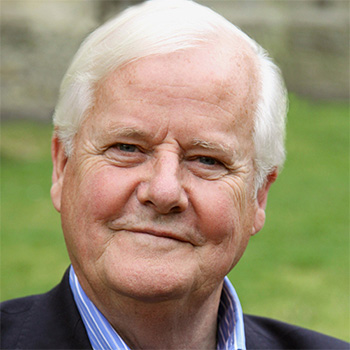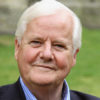Back to series



Purposeful Living for Today and Beyond
VOLUME 5 NUMBER 3 ISSUE OF BROADCAST TALKS (PDF)
BROADCAST TALKS presents ideas to cultivate Christ-like thinking and living. Each issue features a transcription of a talk presented at an event of The C. S. Lewis Institute. The following is adapted from a talk, Purposeful Living For Today And Beyond, recorded in April 2020 for a C.S. Lewis Institute livestream event.
|
I'm speaking from quarantine to all of you presumably in quarantine. I think the heart of the challenge of the pandemic is that it strikes at modernity’s love of control, mastery — control through reason, science, technology, management — and suddenly the angel of death arrives and we realize we’re not in control. So it’s an extraordinary time for reflection and self-examination. I’ve certainly tried to think of it that way. We can think of it in terms of, say, America and the Western world, or the global world, or we can think of it as we’re doing this today in terms of our individual, personal lives. And that’s what I’d like to try and do. I start my book, Carpe Diem Redeemed, with a time when I was on the Eurostar, going from Brussels to London. As you come into St. Pancras station, there are a number of dilapidated Victorian buildings splattered with graffiti. One of them reads like this:
Now that of course was the famous YOLO philosophy (“You Only Live Once”). Many people who followed — they knew it came from the Greeks: “Eat, drink and be merry, for tomorrow we die.” But what many people forget is that one of the original formulations was “You only live once — if then.” In other words, life is short, life is fragile, life is vulnerable, and the question is, How do we live it well? And how do we make sense of it in order to live it well?
The second moment in life, probably one that we’re equally unaware of in most cases, is when we say to ourselves, “I am I, and I won’t be here forever.” In other words, our lives are short; the time is coming when we’ll go; it will soon be the case when nobody knows that we’re here, and there might be hardly a trace on the earth that we have been here. Once again, people with an overdeveloped sense of mortality have a fear of living. And people with an underdeveloped sense of mortality have a sense that they can defy death and live their lives as what’s been called an immortality project. Plastering their names over life. You think of Ramesses II, who is described as the most self-adulatory person in all of human history. If you think of time, there are things about time that are obvious. For example, we can occupy space exclusively, but not time. The Greeks love to tell the story of Alexander the Great visiting the philosopher Diogenes. He asked the crusty old gentleman, rather condescendingly, “What can I do for you?” And Diogenes said, “Get out of my sunlight.” In other words, we can occupy space exclusively, but never time. Equally, as people point out, we can conquer space, but never time. As one philosopher says, “Man conquers space, but time conquers man.” In other words, with our bulldozers and our cell phones and our jets, we can easily conquer space but none of us conquers time. Or again, if you think of it, the time you spend on something really shows the value that you’re putting on whatever it is you’re spending the time on. Those sorts of things are rather obvious if you think about them, and it’s worth thinking about them. But time itself is always a mystery, along with the darkness of evil and the current scientific mysteries like the state of consciousness. Augustine is often quoted. He would say that when no one asked him what time was, he would find it easy to say what it was. But if someone actually asked him to explain it, he didn’t know what to say. Time is a mystery. So when we talk about time, we’re talking about something that’s not a challenge, say for others, atheists or whatever. It’s a challenge for all of us as human beings. So let me lay out a number of steps. I think we have to start thinking it through for ourselves, each of us, and I include myself, because we’re all in this world where life is short and fragile and vulnerable. 1. Are We Committed to a Genuinely Examined Life?First, are we committed to a genuinely examined life? Of course that’s the famous saying of Socrates, probably the most famous saying outside of the Bible: An unexamined life is not worth living. Now you’d think that all human beings would think through life, but the fact is we don’t. And many people have pointed out the deep reasons why we prefer not to. The basic one of course is that at the end of life is death, and we’d rather not face that unpleasant fact, and so we lead an unexamined life. There are two basic reasons that are the sort of dodges or stratagems by which we avoid thinking about death and an examined life. Pascal called one of them “diversions.” In other words, we surround ourselves with busy, entertaining distractions so that we don’t have to think about the ultimate things of life and, above all, death. Of course our world, with all the devices we have today and the so-called triple-screen gazing — we have more diversions than any generation in history. It is said that they are the weapons of mass distraction. The other reason people don’t think about death and the examined life is what is called “bargaining.” People say, Yes it’s important to think about this — but later, when I’ve graduated, when my kids are a little older, or when the mortgage is paid off, or when I’m retired and have time to think about it, then I’ll think about it. It’s important, but later. It’s always later, later, later, and one day, there are no more laters. As Jesus says in His parable, “God says ‘You fool! Tonight your soul is required of you.’” And of course in our Western literature, that’s where the figure of Faust comes in. In other words, the person who wants more power, more knowledge, more experience, more days — he’s prepared to bargain his soul with the devil. But of course the devil has read the small print, and Faust hasn’t. And finally, no more laters, no more days. So we’ve got to be prepared to think through an examined life. I hope everyone who is listening to me today has really thought that through for themselves. 2. Have We All Faced Up to Our Mortality?Second point: Have we all faced up to our mortality? I happen to have been born in China. When I was very small, my family and I were in a famine in north central China, caused by locusts and other things, in which 5 million people died in three months, including my two brothers. I remember growing up with a sense of people telling me that my life was a miracle, and I would ask myself, Why not me? Why did my older brother and then my younger brother die, and I lived? And in China, of course, traditional China at that time, you could walk past a so-called coffin shop, and you could see old men, age sixty and above, sitting in front of their coffins, contemplating their coffins. It was part of Chinese traditional life. More recently in our own day, we have, say, Lin-Manuel Miranda and his famous musical Hamilton, and he said he’s always been fascinated because of a childhood death of a kindergarten friend with people who heard the tick-tock of time at an early age. And of course Alexander Hamilton was one of those, shot by Aaron Burr in a duel. But the questions really faced up to that. Dostoevsky, for example, was part of a radical group in the 1820s, arrested, spent a year in the Peter and Paul fortress, condemned to death, tied to a post, blindfolded, and the drums were rolling. Thinking he was seconds from his execution, he was reprieved, not as an act of mercy but as an act of psychological terror. Ever after that, that sense of closeness to mortality was something very vivid for Dostoevsky, and you can see it in several of his novels. Equally Tolstoy suddenly had a sense, in his fifties in his case, of mortality. One of his characters, Ivan Ilyich says, “What if my whole life has been wrong?” And Tolstoy himself says, “What is the meaning of my life that will survive the inevitable annihilation of my life through death?” Mortality. We’ll all die. And the question is, with death certain and life short, have we really thought through how we live life now in the light of that? 3. Have We Wrestled through the Differences between Our “Résumé Self” and Our “Eulogy Self”?A third point: Have we wrestled through the differences between what David Brooks usefully calls our résumé self and our eulogy self? Take the famous story of Alfred Nobel. He was in South Africa in the 1880s, and, to his horror, one morning he read his own obituary in a French newspaper. The gunpowder king is dead. The man who made his fortune by being able to kill more people faster than ever died yesterday. In fact, it was his brother Ludwig who had died and Alfred lived. But he was so horrified by what he read of what people thought of him that he decided to take his immense fortune, and he left 95 percent of it for what we now know of course as the Nobel Prizes for peace, literature, and so on. He saw what people thought of him. It’s useful for us to ask ourselves what it is we’ve contributed to life in serving the Lord in our time. 4. Have We Thought through the Richness of Our Biblical Jewish and Christian View of Time?
The cyclical, of course, is the Eastern — the Hindu and the Buddhist view of time. Time is a wheel; it’s a circle. We’re attached to the wheel, and the wheel is driven by desire, which leads to craving, which leads to an attachment which binds us to the wheel, and the goal is to escape from the wheel. But the trouble is that freedom is not freedom to be ourselves; it’s freedom from individuality because being an individual is what keeps us bound to the wheel. But you can see in that cyclical view of time that time goes nowhere. It’s part of the world of illusion. History has no purpose, and it’s no accident that within the Hindu and Buddhist worldview, they were never able to have either a high view of human dignity or the grounding for a solid view of modern science. That’s the cyclical view, which of course was the mainstream view throughout history. The Egyptians would have agreed with it; the Babylonians would have agreed with it, and so on. Not just the Hindus and the Buddhists who believe that today. The covenantal view of time is of course the biblical view. God is sovereign. His providence rules history. But as we come to know the Lord, under His providence we become partners with Him in His purposes in our time. That’s the notion of this covenantal view of history. It’s going somewhere, the richest, deepest view of time. The third view is the chronological, which is the view of the secularists, the atheists, the agnostics, the materialists, and so on, who see time as a succession of moments that have no higher significance because there is no God. You have optimists — take someone like Steven Pinker. From the Enlightenment onward, the optimists have believed we can impose our human will on time and direct history to go our own way, although many of them were disillusioned by the evils and the gigantic forces unleashed in the twentieth century, and there are far fewer optimists today. There are also many pessimists. You have people like Samuel Beckett. Time desiccates us, fragments us. With many people, when you mention Beckett they think of Waiting for Godot, but actually his play on time was Krapp’s Last Tape. An old man, sixty-nine years old, listens to recordings of himself when he was much younger. He’s a different person. Time without any meaning, just a succession of the moments, has fragmented him and fractured him into a thousand pieces, and he’s alienated totally. The pessimistic view of time. Why is the covenantal time so deep and so rich? For one thing, history is going somewhere, and time always has purpose. Mircea Eliade, the anthropologist, says that most people have a view of time (if they think about it) that leads them to terror — accidents, disruptions, things like the pandemic break-in. People view time and history as terror; it’s way, way beyond our control. But in the covenantal view of time, time is not a terror, it’s a task. As we discover our callings and serve God’s purpose, we’re not afraid of time. We’re not in control. The Lord is in control. History is moving in His directions, and we do our small part with a deep and rich sense of meaning. The second wonderful thing about the biblical view of time is freedom. As is clear from the Jewish Scriptures, the one thing we absolutely do not know is what will happen tomorrow. You think today of our pundits and so on, they pretend they have all sorts of knowledge, but we don’t. Humans are free. We don’t know what will happen tomorrow, but that’s what actually guarantees the freedom. And what’s magnificent is, if you look at our atheist friends or go back to the Greeks or the Babylonians and the Egyptians, none of them had a view of human freedom. Humans were controlled by fate or, today, say Freud’s psychological things — various forms of determinism, but not free. But in the biblical view, God is sovereign, and He has created us in His image, not sovereign, but significant, and we have freedom. You think of something wonderful, like forgiveness. Forgiveness is a part of human freedom. When we forgive, the past with its burdens can be cut off. And the future, rather than repeating the problems of the past in a new cycle, the future can be free. And you can see how forgiveness frees the past and frees the future to be a world of the second chance. And all of that is part of the biblical view of freedom that comes across in so many different ways. A third wonderful point is that our lives are never futile. Our lives are short and sometimes cut off prematurely. Take Lazarus’s death or people who have tragically died in the current pandemic. Many people’s lives are cut off short — my brothers’, for example. However, our lives are never futile. In other words, in the biblical view, we are acting into history, but we’re looking over the horizon of history to what’s coming after history. You can see in Hebrews 11 that as people live by faith, as so many heroes of the faith did, it says, “The Lord is not ashamed to be their God, and he has a city prepared for them.” So Moses was called to lead his people to the promised land, and he didn’t make it. And for all of us life, in some senses, will be incomplete. There will be a Jordan we can’t cross. There will be a mountain we can’t get over, a task we haven’t finished as we would have loved to if we had more time. But that doesn’t mean our lives are futile or lived in vain. No. We’re acting into history now, which is incomplete. But we’re looking over the horizon of history, and our Lord has something prepared for us which will be the fulfillment of all that we have in mind here. A fourth wonderful point that I love is that in the Scripture the end is not the end. What do I mean by that? That’s actually Reinhold Niebuhr’s idea, because you have two meanings for the word end. End, in the Bible, can be the Latin word finis, ending, full stop, conclusion, period. There are a lot of “ends” like that in our world, and of course death is the final end. And after that, free to us no more on this earth. So that notion of “end” is there in Scripture. And of course we’re realists, and we know that happens, as summer ends and autumn comes and then winter comes and so on. We know the cycle of the universe goes on like that. There are endings like that. But there is another meaning of the word end in the Bible. That is the Greek word telos, which means purpose, climax, culmination, objective, goal. What Niebuhr is saying, what the Bible teaches us, is that in all the endings in the first sense, God is working out His ends in the second sense. So, once again, Christians are realists, but we are never pessimists. We are people of hope, but not because the glass is half full, and not because the market now is bullish rather than bearish. No, those things are purely circumstances. We are hopeful. It happens our own family Guinness motto is spes mea in Deo — my hope is in God. We are hopeful while we’re realists, because the end is not the end.
But then of course, too, mortality marks out generations. Our modern world is suffering from what I call the curse of generationalism. We cut all the generations off to such a narrow year or two years or five years or whatever, and we think they’re all radically different. In fact, every generation is a pulse beat in the life of humanity. And we need to see that we are the grandchildren of our grandparents, and we will have grandchildren in our time, and understand that flow of history and that flow of time that means we’ve got to see the continuity of these things. So we play our part; it’s a small part. My little time — but I’m fulfilling God’s purposes in my time the way our grandparents and their grandparents did in theirs, and we trust that our grandchildren and their grandchildren will do in theirs too. So if you think these things through, you see some of the biblical richness. We are called to walk before God. I say that because a lot of people take carpe diem as atheists do: Grab it while you can! It’s all up to spontaneity, random acts of this, that, and the other. No. People who are really able to improvise, as in jazz or sport, are people who have mastered their discipline — music or football or whatever. Then they can improvise because they have mastered the basics. And for us, the basics — the C.S. Lewis Institute is so good on this—the basics are discipleship, and you can see its great disciples such as Francis of Assisi, who was incredibly spontaneous and able to improvise because he had the basics. We are called to walk before the Lord, and there is no contradiction between that basic walking and the ability to be spontaneous. But then again, we’re called to recognize the signs of the times. That comes in Chronicles. You think of Esther who was there “for such a time as this.” You think of our Lord criticizing His generation. They could read the weather, but they couldn’t read the signs of the times spiritually. And we need to challenge ourselves, because that is something a lot of people haven’t been trained to do. To really see the signs of the times, always thinking in terms of the kingdom and time under the aspect of eternity. And all that leads to what for me is the most wonderful of all: The biblical notion of serving God’s purpose in our generation. Of course that goes back to Acts 13, where Paul in his sermon says a kind of throwaway line talking about King David, “David, after he’d served God’s purpose in his generation, fell asleep.” All we can do is see what the Lord is doing in our time and, through our individual callings, seek to serve Him. So when you think of these things in a much deeper, longer, richer way than I’ve been able to share today, you can see that when we compare the atheist view of time, the chronological time; when we compare the Eastern view of time, the cyclical time; there is nothing, nothing, so rich, so deep and so meaningful as the biblical covenantal view of time. And our challenge is to live it out before the Lord and witness to Him of the richness and deepness of time as we know it under Him. So my almost daily prayer is, Lord, teach us to count our days so that we may make our days count. [Video of the complete version of this talk, including Q &A, is available Here. Additional information about the topic of this talk is included in Os Guinness’s book Carpe Diem Redeemed: Seizing the Day, Discerning the Times (Downers Grove, IL: IVP Books, 2019).]
|
|||


Os Guinness
Author Os Guinness, is the author and editor of more than thirty books, including Fool's Talk, Renaissance, The Global Public Square, A Free People's Suicide, Unspeakable, The Call, Time for Truth, The Case for Civility and his most recent book, Zero Hour America. A frequent speaker and prominent social critic, he has addressed audiences worldwide from the British House of Commons to the U.S. Congress to the St. Petersburg Parliament. Guinness has had a lifelong passion to make sense of our extraordinary modern world and to stand between the worlds of scholarship and ordinary life, helping each to understand the other - particularly when advanced modern life touches on the profound issues of faith. (Photo By Deryck Chan 2013)
 COPYRIGHT: This publication is published by C.S. Lewis Institute; 8001 Braddock Road, Suite 301; Springfield, VA 22151. Portions of the publication may be reproduced for noncommercial, local church or ministry use without prior permission. Electronic copies of the PDF files may be duplicated and transmitted via e-mail for personal and church use. Articles may not be modified without prior written permission of the Institute. For questions, contact the Institute: 703.914.5602 or email us.
COPYRIGHT: This publication is published by C.S. Lewis Institute; 8001 Braddock Road, Suite 301; Springfield, VA 22151. Portions of the publication may be reproduced for noncommercial, local church or ministry use without prior permission. Electronic copies of the PDF files may be duplicated and transmitted via e-mail for personal and church use. Articles may not be modified without prior written permission of the Institute. For questions, contact the Institute: 703.914.5602 or email us.
-
Recent Podcasts
Ralph Waldo Emerson’s Philosophy and Influence
by David George Moore on July 26, 2024Ralph Waldo Emerson was a gifted nineteenth century...Read More
-
The Side B Stories – Nate Sala’s Story
by Jana Harmon, Nate Sala on July 19, 2024
-
Terrorism Through the Eyes of Faith
by Dennis Hollinger on July 12, 2024
-
Recent Publications
Hasn’t Science Proven That Belief in God Is an Outdated Superstition?
by Sharon Dirckx on July 1, 2024Many assume that scientific practice and belief in...Read More
-
Has the Bible Been Corrupted as Some Muslims Claim?
by Andy Bannister on June 1, 2024
-
Seeing Jesus Through the Eyes of Women
by Rebecca McLaughlin on May 15, 2024
0
All Booked
0.00
All Booked
0.00
All Booked
22194
C.S. Lewis’s The Abolition of Man Live Online Small Group 8:00 PM ET
https://www.cslewisinstitute.org/?event=c-s-lewiss-the-abolition-of-man-study-course&event_date=2024-10-02®=1
https://www.paypal.com/cgi-bin/webscr
2024-10-02

Next coming event
Days
Hours
Minutes
Seconds
C.S. Lewis’s The Abolition of Man Live Online Small Group 8:00 PM ET
On October 2, 2024 at 8:00 pmCategories
Speakers

Os Guinness
Author
Team Members

Os Guinness
AuthorOs Guinness, is the author and editor of more than thirty books, including Fool's Talk, Renaissance, The Global Public Square, A Free People's Suicide, Unspeakable, The Call, Time for Truth, The Case for Civility and his most recent book, Zero Hour America. A frequent speaker and prominent social critic, he has addressed audiences worldwide from the British House of Commons to the U.S. Congress to the St. Petersburg Parliament. Guinness has had a lifelong passion to make sense of our extraordinary modern world and to stand between the worlds of scholarship and ordinary life, helping each to understand the other - particularly when advanced modern life touches on the profound issues of faith. (Photo By Deryck Chan 2013)


 People point out that we actually live, whether we are aware of it or not, between two moments as we grow up. One moment is when we say to ourselves, though we’re hardly aware of it, “I am I.” In other words, we’re born from our mother’s womb; there’s a flooding sense of oneness with our mother, parents, family, and suddenly we realize we’re different, we’re individuals. Now of course people with an overdevelo
People point out that we actually live, whether we are aware of it or not, between two moments as we grow up. One moment is when we say to ourselves, though we’re hardly aware of it, “I am I.” In other words, we’re born from our mother’s womb; there’s a flooding sense of oneness with our mother, parents, family, and suddenly we realize we’re different, we’re individuals. Now of course people with an overdevelo The fourth point I’m going to make is by far the most important: Have we thought through the richness of our biblical Jewish and Christian view of time? If you look around the world, there are three classic views of time: The cyclical, the covenantal, and the chronological.
The fourth point I’m going to make is by far the most important: Have we thought through the richness of our biblical Jewish and Christian view of time? If you look around the world, there are three classic views of time: The cyclical, the covenantal, and the chronological. One last point from Scripture, and that is: Make the most of the framing of life through death. With all the talk today of living two hundred years, five hundred years, ten thousand years, some people are saying, through cryonics and life extension and so on, people are raising: What would it mean if you could live a thousand years? Would we procrastinate? You could always put off till tomorrow, because tomorrow would go on for a long time. But what death gives us now — living in the present moment — death is like a framework. Think of a painting framed, or think of a sports game that’s played in a field or in a court. That’s what actually gives it the intensity and the urgency of it; you play only for so many minutes, and so on. And that’s what our lives are like, which is why we want to redeem the time and make the most of it.
One last point from Scripture, and that is: Make the most of the framing of life through death. With all the talk today of living two hundred years, five hundred years, ten thousand years, some people are saying, through cryonics and life extension and so on, people are raising: What would it mean if you could live a thousand years? Would we procrastinate? You could always put off till tomorrow, because tomorrow would go on for a long time. But what death gives us now — living in the present moment — death is like a framework. Think of a painting framed, or think of a sports game that’s played in a field or in a court. That’s what actually gives it the intensity and the urgency of it; you play only for so many minutes, and so on. And that’s what our lives are like, which is why we want to redeem the time and make the most of it.

